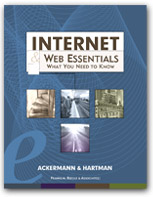The Internet and the Web have been designed so that it’s possible to
be an information provider as well as a consumer. The protocols that support
the Internet give all nodes equal status, Web browsers with graphical interfaces
are commonly used, and the means for preparing Web pages are not difficult.
This has led to a large amount of information available in the form of Web
pages, and the expectation that virtually every organization or business has
a Web presence. These factors make it important that you understand the technical
and design issues involved in creating, providing, and evaluating Web pages
and Web sites.
The source for a Web page is a plain text file that contains HTML tags.
A browser, acting as a client, requests the source for a Web page from a computer
that acts as a Web server. When the file is retrieved, the browser displays
it in its window. In order to make information available on the Web, then,
it is necessary to place the source on a Web server.
Designing a Web page involves several facets. Most importantly you need
to identify the purpose of the page. Other items to consider include being
aware of the technical considerations involved in displaying a Web page, identifying
the audience, looking at other Web pages with a similar purpose, identifying
the content, and coming up with an appropriate design. The Web page ought
to be tested with more than one computer system and browser.
A Web site is a collection of Web pages with a common theme or purpose.
In designing a Web site you need to come up with a scheme for presenting and
arranging the information. The presentation ought to support the fact that
the information is related, and the arrangement often should mirror the logical
structure of the information.
A Web page can be written using a simple text editor, but there are other
types of editors or ways to create a Web page. These include HTML editors—text
editors that include easy ways to insert HTML tags into a file, conversion
tools—tools that convert a file from one format such as a spreadsheet
or word-processing document to HTML, services that create a Web page out of
information you provide, and visual editors—editors that provide tools
to produce a Web page without you having to insert HTML.
There are several issues to consider when evaluating a Web page. These
include
Putting information on the Web means taking your source files and placing
them on a Web server. Some Internet service providers, Web-based services,
and organizations provide space for Web pages. If these don’t suit your
needs, you can pay a monthly fee to a Web presence provider—a company
that provides space for and tools to create and maintain a Web site. FTP is
often used to transfer a source file to a Web server.
Once a Web page or site is on a Web server you’ll want to make it
possible for other people to find it easily. There are several services that
will submit the URL to various search engines and directories. It’s also
possible to advertise your site on the Web either through paid advertisements
or so-called link exchanges. Be sure to read tips available on the Web about
ways to announce your Web site and to get it noticed.
Summary | Terms
| Exercises | FYIs

